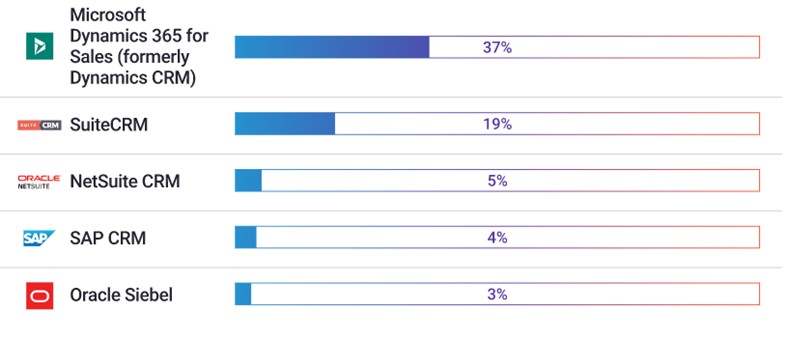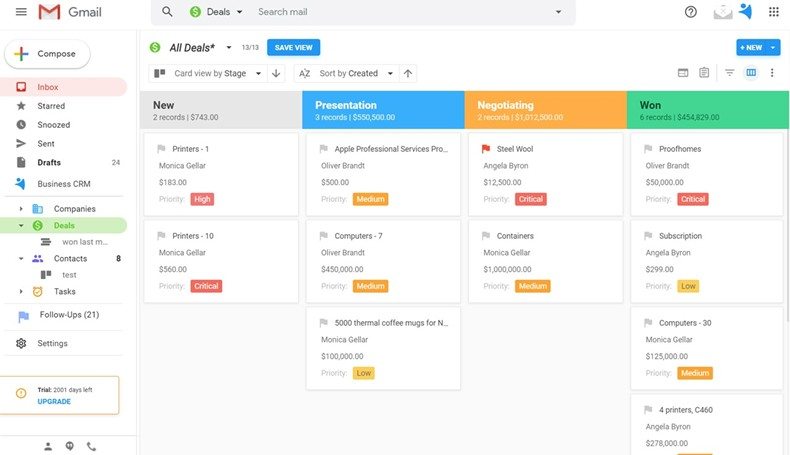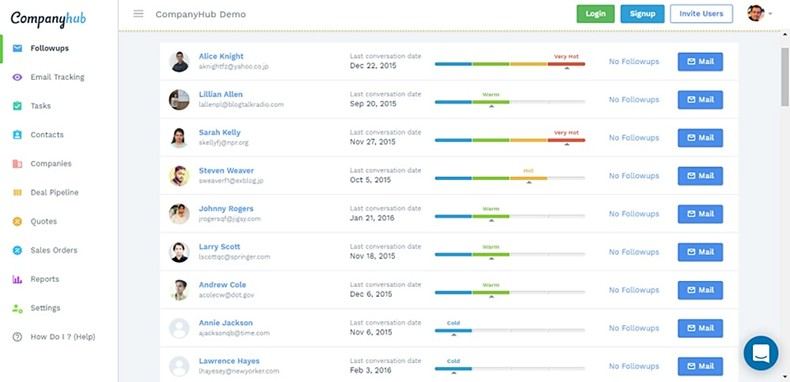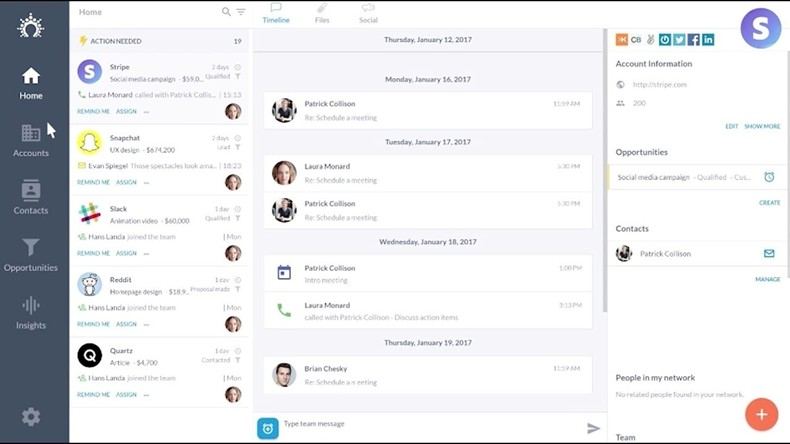The CRM market seems to be reaching saturation. But that's all about quantity. Quality is another story: Only 18% of some 400 CRM companies on G2 are rated between 4 and 5 stars. Such a low satisfaction rate greases the wheels for startup CRMs to emerge and evolve.
Being big and mighty is not always an edge.
Look at the car market: Jeep Wrangler, an American Dream on wheels, has not monopolized the industry despite its size and horsepower. Many fantasized about owning a Wrangler in the '80s—but eventually opted for another car. Some drive classic Fords, some choose affordable Chevrolets, and some prefer tiny Smart Cars just because they fit everywhere.
In the world of CRMs, it's pretty much the same. If you're a small team of 15, a giant CRM like Salesforce, SAP, or Oracle looks like a scary monster rather than a handy tool to streamline sales.
In 2019, when CRM is no longer a novelty, companies have realized their genuine needs and stopped overpaying for the features that'll likely stay untouched for years. Instead, they are taking a closer look at lesser-known and simple solutions, which have an edge (several, actually) over big CRMs.
Their benefits are many. Here are five major ones.
1. Better Customer Support Service
Nowadays, popular short-term rental broker Airbnb has 5+ million listings in 191 countries. It's a safe bet to assume that every other reader of this article is among the 150+ million users of its website. But the truth about the company's tough start in 2008 remains unfamiliar to most users.
When Airbnb's CEO Brian Chesky and colleagues first applied to Y Combinator in 2008, they met its co-founder Paul Graham. At the very first meeting, his response to their complaint "we don't get too much traction right now" was this: "Go to your users. Get to know them. Get your customers one by one."
Chesky and Joe Gebbia literally started visiting their hosts' homes, photographing their places, checking on their client experience, and learning what people love.
Green startups (which Airbnb was in 2008) usually don't have many clients, so they do their utmost to win potential customers. They are ready to commute from Mountain View to New York every day or, in the case of startup CRMs, to join a one-hour conversation and explain their software to you from A to Z.
I'm not saying larger CRMs always have poor support. Huge companies may establish perfectly functioning customer support services, although that's quite rare. Size matters here. It makes a difference whether you have 1,500 clients that fell from the sky or only 100, earned with blood and sweat.
Fast fact: 90% of customers rate an "immediate" response as important or very important when they have a customer service question. (HubSpot Research)
If you have 100, you know their value. And you will treat them as people you care about, assign a personal manager to each, and always be in touch. By contrast, larger companies often send scripted messages via a chatbot and suggest you read help center articles.
2. Ease of Use: No Need for CRM Experts
Large CRMs like Salesforce can't boast about the simplicity of their product. That's not surprising: Such solutions favor their enterprise partners and can neglect the needs of small and midsize businesses. G2's CRM average for "ease of use" and "ease of setup" is 92% and 89%, respectively, while Salesforce's is only 81% and 75%.
Fast fact: 65% of CRM users consider ease of use to be the most important requirement when selecting a CRM solution. (IBM)
Good-quality small CRM products surpass top dogs by that yardstick. Their products aren't stuffed with lots of features, and many updates are yet to come. A plainer interface and not-so-detailed analytics are common "deficiencies" of CRM startups as well. But that's for the better, as small (and sometimes midsize) businesses usually don't have spare budget to hire CRM experts to set up the system and explain how it works to marketing and sales teams.
Big CRMs don't offer you this luxury, and they have a steeper learning curve. Instead, giant Salesforce offers a course that lasts up to five days and costs up to $5,000. So you basically have two options: Invite an in-house specialist to run a CRM for you, or pay tens of thousands of dollars to educate your employees.
3. Quick Bug Fixes and Frequent Updates
The world's most renowned Q&A website, Quora, is full of questions like "Why can't Microsoft/Google/Apple fix minor bugs or it takes ages to fix them?"
Its because those companies are ridiculously large; they have huge teams and plenty of bureaucratic constraints. They make a yearly roadmap for updates and fixes, often failing to include bugs revealed by clients. The same happens in other niches, including the CRM industry.
But the CRM vertical is not an oligopoly. Salesforce owns about 20% of the market, which is impressive, but not enough to eliminate other players. Those that fix bugs faster and roll out updates frequently have a higher chance to retain users, as it's easy to cancel a subscription and end up with the competition.
Fast fact: It takes a customer 12 positive experiences to redeem one unresolved negative experience (Understanding Customers)
Aside from being faster with updates, young companies strive to address issues ASAP. New CRMs don't usually have many customer reviews; even 12 is a large number. That's why they can't afford to receive even a single negative review. Startup CRMs are open for client feedback and quickly fix bugs upon request to avoid negative experiences. Clients have a direct impact on the product and often find this influence attractive.
4. A Do-It-Yourself Approach to Customization
Most, if not all CRMs proudly speak of their extensive customization.
"Bpm'online platform enables users to jumpstart using the system while providing unlimited possibilities for application customization and configuration."
"Microsoft Dynamics 365 is designed to allow system administrators and users the flexibility of customizing and configuring the system to meet their specific needs."
They all say the same thing.
Which is by no means wrong, and big CRMs can be customized just the way you want them. That comes at a price, though. Just as with CRM-setup, you'll need to hire an expert or even a software developer to build an operational CRM tailored to your needs. If something goes wrong, you pay more and wait again for the second version. Can small businesses afford this extra hassle?
By contrast, less complex CRMs are made by startups that already know the pain of the inability to control their own company while using inflexible software.
Instead of marketing the possibility of customization, they market the way it can be implemented. I'd call it the "do-it-yourself" approach, as CRM configuring is more LEGO construction than revision of program code, in this case. You make all of the changes on your own and can adjust settings if something doesn't seem right.
5. Affordable Pricing, No Hidden Fees
Enterprise CRMs, like those of Oracle and Microsoft, charge you a fortune for basic functionality. Both come at a minimum of $65 per user. The only CRM from the A-list that offers an affordable starter pack is (surprisingly) Salesforce; its Essentials solution is $25 per user per month.
You think: "what's the catch?" The truth is that all those features that make your mouth water are not in that pack. You're going to pay, a lot, to unlock the miracle sales boosters advertised to you in reviews, media, and on the main page of the CRM's website. To access the complete bundle of sales tools, you need to pony up a minimum of $100 per employee.
Fast fact: The average price of the full-feature CRM package is $58 per user/month, based on the pricing plans of 35 popular CRMs.
That $58 is the rough industry average for a full-featured CRM, whereas the price for a startup's CRM is usually $10-20 less. As for the minimum package, you can pay as little as $10 per user/month for basic functionality. Some startups provide you with all features in the cheapest plan, charging more only for better support and more users/contacts.
Top 3 Promising CRM Startups
1. NetHunt CRM
Founded: 2015
Pricing: $24-48
NetHunt CRM is a Gmail-based CRM that doesn't require you to use a standalone application, although it offers that as well. It integrates with GSuite Apps, transforms your sales process into a neat pipeline right in Gmail, and automatically links emails to the client's history.
The best feature of NetHunt is the "Do-it-yourself" customization I noted earlier. You can personalize the interface in detail, change and replace fields, adjust views and permissions, and, most important, build your pipeline with custom stages.
The rest of the essentials include email and link tracking, bulk email sending, follow-up scheduling, and contact auto-fill with bulk record updates.
Pros:
- Native-like Gmail & GSuite Integration
- Flexible customization of any element
- Simple setup and onboarding
- All interactions linked to the lead's record
- Contact auto-create feature
- Prompt responses from support
Cons:
- No email templates and automations (to be added soon, apparently)
- No integration with phone systems
2. CompanyHub CRM
Founded: 2015
Pricing: $15-42
CompanyHub CRM is a standalone solution for small businesses; its major edge is follow-up suggestions based on a lead's "hotness" indicator. The software automatically identifies which lead needs communication and should be contacted as soon as possible.
Other features are sales pipeline and reporting, entry-level email automation, and sales bots that can automatically follow up with the client with basic messages. The company also has an emphasis on customization and allows adjusting of the CRM interface for different industries using a drag-and-drop editor.
Pros:
- Interface customization with a drag-and-drop editor
- Smart follow-up suggestions
- Sales bots for quick follow-ups
- Visualized sales reporting
- Support for 30+ languages
- Email templates and scheduling
Cons:
- Lack of native integrations
- No tags for easy filtering
3. Salesflare CRM
Founded: 2014
Pricing: $30
Salesflare CRM almost eliminates manual data entry. Smart algorithms automatically gather user data from various sources, including emails, social profiles, and third-party programs. The CRM's dashboard also shows you a user-friendly timeline and the minimum number of tabs, which is a plus for those who have never used a CRM before.
Another essential feature of Salesflare is a quick overview of what has occurred recently and points out what requires your attention today. The CRM tracks and notifies you about email clicks and opens as well as website visits. It has integrations with Gmail and Office 365, and automatically logs meetings and phone calls.
Pros:
- Smart daily overview of the company's sales
- Automatic data gathering from third-party sources
- Sleek dashboard and minimum tabs
- Click, visit, and email open notifications
- Automatic logging meetings and phone calls
- Email history and files attached to the contact
Cons:
- Lack of native integrations
- No email automation
Conclusion
There is no cause to be afraid of the lesser-known and new CRM solutions when there are reviews from G2 and Capterra at your fingertips. In fact, there are more reasons to fear older and larger companies, especially their disregard for their client's needs. Oracle, SAP, and Microsoft occupy the bottom positions in the latest G2 customer satisfaction report:

Those numbers do nothing but set off alarm bells and make businesses consider startup CRMs that have no trouble with customer satisfaction, thus ranking high. NetHunt CRM is fourth with a 83% satisfaction score, while Salesflare is ranked 6th with 81%.
As the economy becomes more customer-centric, only those who adopt a "client first, product second" approach will last. And according to this report, those are CRM startups, not traditional CRMs.







